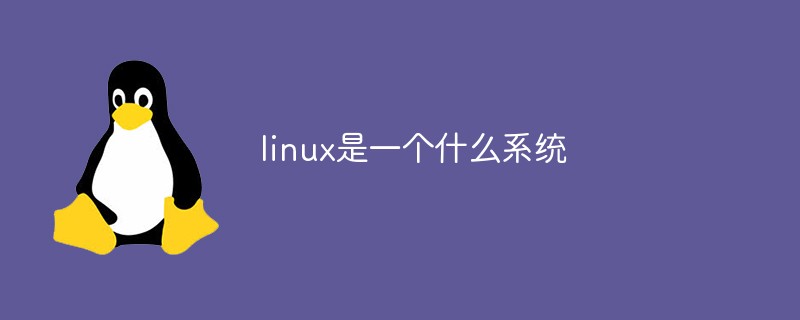Home > Article > Operation and Maintenance > What kind of system is linux?
Linux is a multi-user, multi-tasking operating system based on POSIX that supports multi-threading and multi-CPU. Linux inherits the network-centric design philosophy of Unix and is a multi-user network operating system with stable performance. .

#The operating environment of this tutorial: linux5.9.8 system, Dell G3 computer.
Linux, the full name of GNU/Linux, is a UNIX-like operating system that is free to use and freely disseminated. Its kernel was developed by Linus Benedikt Torvalds on October 5, 1991. Initial Release.
Linux was originally designed based on Intel x86 series CPU architecture computers. It is a POSIX-based multi-user, multi-tasking operating system that supports multi-threading and multi-CPU. It is developed by adults from all over the world. Designed and developed by thousands of programmers, the original purpose of developing the Linux system was to create Unix-like operating system compatible products that were not subject to any commercial software copyright restrictions and could be freely used around the world.
Linux can run major Unix tool software, applications and network protocols. It supports 32-bit and 64-bit hardware.
Linux inherits the network-centric design philosophy of Unix and is a multi-user network operating system with stable performance.
In the past 20 years, Linux systems have been mainly used in three major fields: server-side, embedded development and PC desktop, of which the server-side field is the top priority. For example, the large and very large Internet companies that we are familiar with (Baidu, Tencent, Sina, Alibaba, etc.) are all using the Linux system as their server-side program running platform. More than 90% of the top 1,000 websites in the world and China use the mainstream system. All are Linux systems.
Linux has hundreds of different distributions, such as debian and archlinux based on community development, and Red Hat Enterprise Linux, SUSE, Oracle Linux, etc. based on commercial development.
The reason why the Linux operating system is so popular is that it has the following excellent features:
Linux is not only free; Open source, meaning anyone can get its code and modify it to suit their needs. In fact, this has spawned a huge ecosystem of dedicated Linux distributions, which we will explore in the section "Common Linux Distributions".
Linux is compatible with Unix systems. The system is built using some of the same technologies as the UNIX operating system and has almost all the excellent features of Unix (the stability and security of the system are particularly outstanding) ).
Compared with other operating systems, Linux is easier to install and will not be restricted by any commercial version.
Linux makes it possible to do all sorts of actually useful and creative things. For example, we can load Linux's live boot image on a USB flash drive, start a computer whose hard disk has crashed, and then find and solve the problem. Or, because Linux is a true multi-user operating system, it is so private and stable that the entire team can log in locally or remotely to work at the same time.
Linux provides a sophisticated software package management system that allows you to confidently install and maintain software applications in every online resource library.
....
Of course, there are many other features of the Linux operating system, so I won’t go into details here. I believe that as you learn more about Linux, you will have more experience.
Related recommendations: "Linux Video Tutorial"
The above is the detailed content of What kind of system is linux?. For more information, please follow other related articles on the PHP Chinese website!